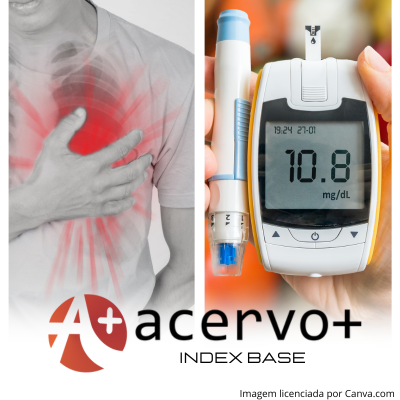Uso de inibidores SGLT2 na prevenção de insuficiência cardíaca em adultos com diabetes mellitus tipo 2
##plugins.themes.bootstrap3.article.main##
Resumo
Objetivo: Analisar as evidências disponíveis sobre a eficácia dos inibidores de SGLT2 na prevenção da insuficiência cardíaca em adultos com diabetes mellitus tipo 2. Métodos: Trata-se de uma revisão integrativa da literatura realizada através das bases PubMED, Biblioteca Virtual em Saúde (BVS) e Periódico CAPES, usando os descritores: “Sodium-Glucose Transporter 2 Inhibitors”, “Prevention”, “Adults” e “Heart Failure” e obtendo o truncamento de pesquisa: (Sodium-Glucose Transporter 2 Inhibitors) AND (Prevention) AND (Heart Failure) AND (Adults). Foram encontrados 367 artigos, filtrados conforme critérios de inclusão (idiomas português, inglês e espanhol; período de 2020 a 2025; artigos completos) e exclusão (artigos duplicados, resumos, fora do escopo). Resultados: Inibidores de SGLT2 previnem eficazmente a insuficiência cardíaca em diabéticos tipo 2, através de múltiplos mecanismos cardioprotetores que vão além do controle glicêmico, como natriurese e melhora hemodinâmica. Considerações finais: A resposta ao tratamento e a amplitude dos benefícios, incluindo proteção renal e cognitiva, são influenciadas por características do paciente, reforçando seu uso estratégico e precoce.
##plugins.themes.bootstrap3.article.details##
Copyright © | Todos os direitos reservados.
A revista detém os direitos autorais exclusivos de publicação deste artigo nos termos da lei 9610/98.
Reprodução parcial
É livre o uso de partes do texto, figuras e questionário do artigo, sendo obrigatória a citação dos autores e revista.
Reprodução total
É expressamente proibida, devendo ser autorizada pela revista.
Referências
2. BAVIERA M, et al. Effectiveness and safety of GLP-1 receptor agonists versus SGLT-2 inhibitors in type 2 diabetes: an Italian cohort study. Cardiovascular diabetology, 2022; 21(1): 162.
3. BIRKELAND KI, et al. Lower cardiorenal risk with sodium-glucose cotransporter-2 inhibitors versus dipeptidyl peptidase-4 inhibitors in patients with type 2 diabetes without cardiovascular and renal diseases: A large multinational observational study. Diabetes, obesity & metabolism, 2021; 23(1): 75–85.
4. BITER HI, et al. The impact of using SGLT-2 inhibitor on left ventricular longitudinal strain and NT-proBNP levels during six-month follow-up in diabetic patients with and without coronary artery disease with preserved ejection fraction. Kardiologia polska, 2024; 82(6): 640–646.
5. CHAN YH, et al. The impact of weight loss related to risk of new-onset atrial fibrillation in patients with type 2 diabetes mellitus treated with sodium-glucose cotransporter 2 inhibitor. Cardiovascular diabetology, 2021; 20(1): 93.
6. CHEN K, et al. Time to benefit of sodium-glucose cotransporter-2 inhibitors among patients with heart failure. JAMA network open, 2023; 6(8): 2330754.
7. GAMAZA-CHULIÁN S, et al. Effect of sodium-glucose cotransporter 2 (SGLT2) inhibitors on left ventricular remodelling and longitudinal strain: a prospective observational study. BMC cardiovascular disorders, 2021; 21(1): 456.
8. GIUGLIANO D, et al. SGLT-2 inhibitors and cardiorenal outcomes in patients with or without type 2 diabetes: a meta-analysis of 11 CVOTs. Cardiovascular diabetology, 2021; 20(1): 236.
9. KALE S e TAHRANI AA. Sodium-glucose co-transporter-2 inhibitors in patients with type 2 diabetes mellitus without established cardiovascular disease: Do they have a role in primary prevention? Metabolism open, 2021; 10(100082): 100082.
10. KOHLMORGEN C, et al. Dapagliflozin reduces thrombin generation and platelet activation: implications for cardiovascular risk reduction in type 2 diabetes mellitus. Diabetologia, 2021; 64(8): 1834–1849.
11. LANGSLET G, et al. Empagliflozin use is associated with lower risk of all-cause mortality, hospitalization for heart failure, and end-stage renal disease compared to DPP-4i in Nordic type 2 diabetes patients: Results from the EMPRISE (Empagliflozin Comparative Effectiveness and Safety) study. Journal of diabetes research, 2024; 6142211.
12. LEE HF, et al. Major adverse cardiovascular and limb events in patients with diabetes and concomitant peripheral artery disease treated with sodium glucose cotransporter 2 inhibitor versus dipeptidyl peptidase-4 inhibitor. Cardiovascular diabetology, 2020; 19(1): 160.
13. MAGURNO M, et al. Effects of SGLT2-inhibitors on comprehensive geriatric assessment, biomarkers of oxidative stress, and platelet activation in elderly diabetic patients with heart failure with preserved ejection fraction. International journal of molecular sciences, 2024; 25(16): 8811.
14. OSTROMINSKI JW, et al. Sodium-glucose co-transporter 2 inhibitors and new-onset diabetes in cardiovascular or kidney disease. European heart journal, 2025; 46(14): 1321–1331.
15. PALMIERO G, et al. Impact of SGLT2 inhibitors on heart failure: From pathophysiology to clinical effects. International journal of molecular sciences, 2021; 22(11): 5863.
16. REAL J, et al. Cardiovascular and mortality benefits of sodium-glucose co-transporter-2 inhibitors in patients with type 2 diabetes mellitus: CVD-Real Catalonia. Cardiovascular diabetology, 2021; 20(1): 139.
17. SCHECHTER M, et al. Cardiorenal outcomes with sodium/glucose cotransporter-2 inhibitors in patients with type 2 diabetes and low kidney risk: real world evidence. Cardiovascular diabetology, 2021; 20(1): 169.
18. SEONG JM, et al. Comparison of heart failure risk and medical costs between patients with type 2 diabetes mellitus treated with dapagliflozin and dipeptidyl peptidase-4 inhibitors: a nationwide population-based cohort study. Cardiovascular diabetology, 2020; 19(1): 95.
19. SUZUKI Y, et al. Comparison of cardiovascular outcomes between SGLT2 inhibitors in diabetes mellitus. Cardiovascular diabetology, 2022; 21(1): 67.
20. TROMBARA F, et al. Impact of chronic GLP-1 RA and SGLT-2I therapy on in-hospital outcome of diabetic patients with acute myocardial infarction. Cardiovascular diabetology, 2023; 22(1): 26.
21. UL AMIN N, et al. SGLT2 inhibitors in acute heart failure: A meta-analysis of randomized controlled trials. Healthcare (Basel, Switzerland), 2022; 10(12): 2356.
22. VADUGANATHAN M e JANUZZI JL. Preventing and Treating Heart Failure with Sodium-Glucose Co-transporter 2 inhibitors. The American journal of cardiology, 2019; 124(1): 20–27.
23. VISTISEN D, et al. Empagliflozin is associated with lower cardiovascular risk compared with dipeptidyl peptidase-4 inhibitors in adults with and without cardiovascular disease: EMPagliflozin compaRative effectIveness and SafEty (EMPRISE) study results from Europe and Asia. Cardiovascular diabetology, 2023; 22(1): 233.
24. WANG W, et al. SGLT2 inhibitors are associated with reduced cardiovascular disease in patients with type 2 diabetes. Mayo Clinic proceedings. Mayo Clinic, 2023; 98(7): 985–996.
25. YANKAH RK, et al. Sodium-glucose cotransporter-2 inhibitors and cardiovascular protection among patients with type 2 diabetes mellitus: A systematic review. Journal of diabetes research, 2024; 9985836.

